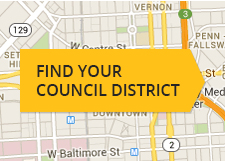Council President Brandon Scott Announces Oversight Hearing on Administration's Failure to Send Water Bills to Scores of Residents
Council President Brandon Scott Announces Oversight Hearing on Administration's Failure to Send Water Bills to Scores of Residents
New Revelations of Missing Bills and Regular Constituent Complaints Raise Serious Questions about the Scope of DPW’s Water Billing Problems
BALTIMORE, MD (January 30, 2020) — Baltimore City Council President Brandon M. Scott announced Thursday plans to hold an oversight hearing on the administration’s failure to send water bills to scores of commercial and residential water customers, the scope of which is currently unknown.
WBAL-TV reported in October 2019 that the City failed to bill the Ritz Carlton Residences, a luxury condo development, for several years. This resulted in a loss of over $2 million to the City.
Today, the Baltimore Sun reported that the City has failed to send water bills to at least 40 additional businesses, who self-reported to the City that they were not receiving water bills. The administration indicated they are unsure of the scope of the problem and are unable to say when it will be fixed.
“Whether it’s a homeowner whose water bill is too high, or commercial customers whose bills are non-existent, we must do better,” said Council President Scott. “If this administration can't figure out how to send people their water bills, how can people trust us to solve the other serious problems they face? This Council will continue to hold DPW accountable to the residents of Baltimore until we have faith that the problem is being addressed with the seriousness and urgency it deserves.”
The oversight hearing will request detailed answers to the following questions:
- How much money does the administration estimate the City has lost due to its failure to send out water bills to all customers?
- How many commercial customers have self-reported not receiving a water bill?
- What efforts are underway to ascertain the full scope of the problem?
- Is a comprehensive audit of the water billing system underway? If so, what is the scope of that audit and when will it be released to the public?
- What checks, if any, has the administration put in place to proactively address this problem?
- What does the administration think is causing some customers not to receive water bills?
- What solutions – whether legislative or administrative – does the administration propose to fix this issue in order to restore the public’s faith in Baltimore’s water billing system?
The resolution calling for the hearing will be introduced by the Council President at the next City Council meeting on Monday, February 10 and assigned to the Legislative Investigations Committee, chaired by Councilmember Kristerfer Burnett (8th District). Representatives from the Mayor’s Office and the Department of Public Works, which administers the City’s water utility service, will be requested to attend.
“I’m deeply concerned to hear that there are ongoing issues with our water billing system,” said Councilmember Burnett. “Every day Baltimore residents struggle to pay their bills, and it’s disheartening to hear that businesses and large corporations aren’t paying their fair share. We need answers and I’ll be working with President Scott to lead an investigation into this very quickly.”
The Baltimore City Council has been active in using its legislative and oversight powers to hold the administration and Department of Public Works accountable. Earlier this month, the Water Accountability and Equity Act became law. When implemented, it will improve the dispute resolution process when a business or resident receives what they believe to be an erroneous water bill, making the process more transparent and solutions-oriented.
It will also make water affordable for all Baltimoreans, ensuring that no resident is paying more than 3% of their monthly income on water. According to the legislation, the affordability guidelines are set to be implemented in April 2020.
In the last year alone, the City Council has called for informational hearings on basement backups of raw sewage, how DPW evaluates its operating procedures, safety for workers at the City’s water treatment plants, efforts to clean alleys, cut grass, and board up vacant properties, and disparities in response times for DPW-related service requests.
CONTACT
Candance Greene
Deputy Director of Communications
Office of City Council President Nick J. Mosby
443-602-5346
candance.greene@baltimorecity.gov

